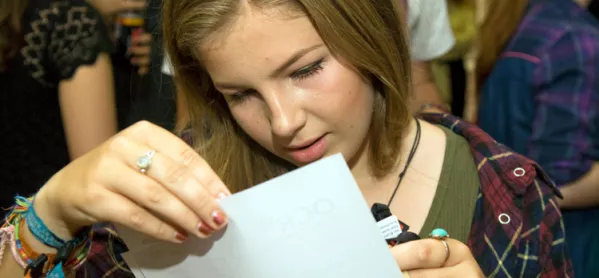On Thursday, at about 6am, thousands of A-level students will rise from their restless beds and begin refreshing their mobile phones. This will be even more frenzied than the usual social media obsession. It might well be the one day in the year when Facebook or Twitter isn’t the first app checked by the country’s newest adults. On Thursday morning, we’ll be wearing our thumbs out on our email inboxes, furiously refreshing in anticipation of the message that will shape the next few years of our lives.
For many, the next few days represent the final meters in the race for a university place and the beginning feels far distant. Most students will have been to a university open day last July - and fallen in love with its science labs, library, ensuite rooms or on-campus nightclub - then immediately been disappointed by the length of the admissions process.
I wrote my personal statement last October, sent it in earnest to my favourite five institutions and spent a week at interview in November. Last Christmas was a nervous one, but I received an offer letter in January, spent February and March worrying about revising for exams, April and May worrying about taking them, and since June I’ve been worrying about the results. It’s an unpleasant feeling knowing that somewhere in the UK there’s a sheet of paper with four letters on it that will decide my future.
“It’ll be the best holiday of your life!”, they said. It’s been like going on holiday to Colombia with a kilogram of cocaine in my back pocket, and spending the whole time in airport security. When I’m working part-time on a supermarket service counter, my regular customers cheerfully enquire as to how nervous I am or - if they forget the date - how results day went. The truth is, I’m trying to forget about it.
What a luxury that would be, though, in the week where the national press accepts its annual mandate of trying to scare the already hysterical students to death. When not worrying about our own competency, we’re given special cause to worry about the competency of those entrusted to give us fair and accurate grades. Last week’s revelations about exam boards’ ‘guesstimation’ of A-level results ran counter to the only other experience we’ve had of them: the ludicrously complex pedantry of the mark scheme. To know that the examiners haven’t got time to consult them - or, worse, are unqualified to do so - is a sickening feeling.
The university application process is laden with complication, delay, and continuous unease. The election of the most powerful diplomat in the world, the UN secretary-general, took three months. The application time for contestants on The Great British Bake Off is about a month. The deadline for claiming National Lottery winnings is 180 days. But applicants to university spend over a year thinking, worrying and fantasising about their places.
And throughout, what handier companion could we have than Ucas? The helpful university admissions service that manages your choices for the future and uses your data for advertising revenue, all at the touch of a button. Emails from Ucas alternate between the rare, potentially life-changing and tantalising “something has changed on your account” and the meaningless trivia sent by advertisers - capitalising on our captive data to the tune of £12m per year.
In any case, I’ve got more pressing things to worry about. As Thursday approaches, the inevitable worry is escalating and I can’t even open my laptop without being told that the chances of my passing are smaller than they’ve ever been. OCR helpfully reminds me that their results “remain provisional” until well after my first term at university is due to begin. Ucas continues to send me junk, which I expectantly open. The only real certainty is that on Thursday morning, The Daily Telegraph will find some attractive, privately educated girls who got into Oxbridge and photograph them jumping. All the rest could go very, very wrong.
